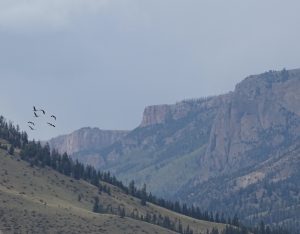 Editor’s Note: This piece, edited and trimmed for length, was published in the Washington Post. But here it is for those of us hitting a paywall and to consider the unedited version.
Editor’s Note: This piece, edited and trimmed for length, was published in the Washington Post. But here it is for those of us hitting a paywall and to consider the unedited version.
By Maddy Butcher
Halfway through a 20-mile ride, I choose to expound confidently on a topic I thought I knew. My friend listened from the saddle as he looked down the canyon. He smiled and seemed to ponder my words. When I wrapped up the treatise, all he said was: “Hmm.”
It wasn’t long – maybe a week later – when I realized I’d been hastily-informed and foolishly assured in my understanding of the facts. I confessed as much to my friend, who said, “Oh?”
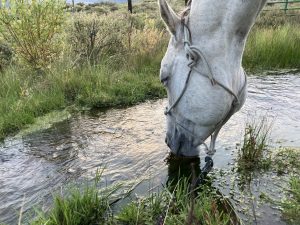 In the rural west, quiet reserve is an essential skill and a fading art form, lost on people like me who rush to react and to be heard. Inevitably, this way of being is losing ground to louder, more visible behavior. But we should take a page from those with agrarian mindsets, where it pays extra to observe, take stock, and reserve judgment while a day or a season runs its course.
In the rural west, quiet reserve is an essential skill and a fading art form, lost on people like me who rush to react and to be heard. Inevitably, this way of being is losing ground to louder, more visible behavior. But we should take a page from those with agrarian mindsets, where it pays extra to observe, take stock, and reserve judgment while a day or a season runs its course.
When it comes to public commenting, city people (who tend to have more money and more formal education than country dwellers), are driving the polarization, said Harvard’s Todd Washburn in this piece.
Does book learning and more complicated social networks encourage people to emote? Washburn thinks so. He pointed to a Pew Research paper and wrote that this demographic is less likely to mix with people who don’t share their views and are more likely to consider them hostile. “Their views are often inaccurate and their political reasoning is often poor — precisely the characteristics that education is supposed to counteract,” he wrote.
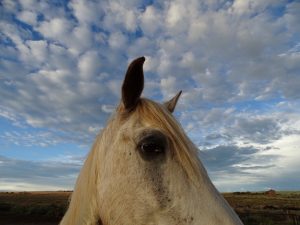 Curtis Moore grew up in the small town of Bishop, California, and spent his summers packing mules in the Eastern Sierras. Later, he cowboyed at a nearby ranch before becoming a lawyer with experience in natural resource conflict resolution. He likes to cite Aldo Leopold who wrote “Is education possibly a process of trading awareness for things of lesser worth?”
Curtis Moore grew up in the small town of Bishop, California, and spent his summers packing mules in the Eastern Sierras. Later, he cowboyed at a nearby ranch before becoming a lawyer with experience in natural resource conflict resolution. He likes to cite Aldo Leopold who wrote “Is education possibly a process of trading awareness for things of lesser worth?”
He told me he’s careful to check what he knows academically against what he sees in front of him at any given moment, be it a conflict resolution meeting or a horsemanship experience. “It’s what Thich Nhat Hahn would call mindfulness,” Moore said.
Erin Nissen is a fourth-generation farmer in the San Luis Valley of southern Colorado. Her family harvests a million pounds of potatoes each year. I asked for her thoughts on online acrimony and she laughed, “My dad thinks if only people worked longer hours, they wouldn’t have time for the nonsense.” When pressed, she pointed to the fact that most people are generations removed from their farming and ranching roots. In 1900, 41 percent of the American workforce was employed in agriculture. That number has fallen to less than two percent today.
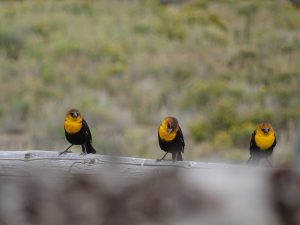 “I tend to study, sit back, listen, watch. It’s a calmer way of doing things,” said Nissen. “That’s a pretty common thing in ag, although water meetings can get heated.”
“I tend to study, sit back, listen, watch. It’s a calmer way of doing things,” said Nissen. “That’s a pretty common thing in ag, although water meetings can get heated.”
Not all water meetings and not all Westerners are quiet and mindful. I live in a county that elected Lauren Boebert, after all.
Not all Easterners are pushy and forward. My friend’s “oh” is an alternative to “ayuh,” a Maine expression endlessly parodied but which, at its core, is beautifully reflective, rather than reflexive lingo. Growing up, I heard it a lot, especially from fishermen, lobstermen and carpenters in my native, coastal town.
Before he wrote Charlotte’s Web, E.B White moved to Maine and worked a farm, raising sheep, chickens, and crops. In One Man’s Meat, he wrote that farmers were “impressed by education, but they have seen too many examples of the helplessness and the impracticality of educated persons to be either envious or easily budged from their position.”
Fence sitting – literally sitting on the fence and watching animals, feeling the wind shift, smelling the sage after a hard, fleeting rain – is not a waste of time. It is social engagement of the highest order. It’s honorable listening that can inform one’s worldview more than any political science report. In a city? Watch the birds on a wire as they tilt their heads, scrape their beaks, flit away and return.
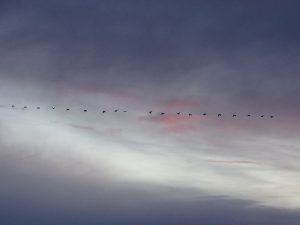 “Doing all the time creates problems,” said Joe Morris, a rancher in central California. “You really need to observe, learn, listen, then respond. There are teachers everywhere…All you need is students.”
“Doing all the time creates problems,” said Joe Morris, a rancher in central California. “You really need to observe, learn, listen, then respond. There are teachers everywhere…All you need is students.”
Steven Kull is the director of the Program for Public Consultation at the University of Maryland and is founder and president of Voice of the People. His research shows that most people like the simplicity of taking one side or another and that there tends to be tribalism especially among elaborate urban social groups. “But there’s no doubt that engagement with nature has a way of connecting us to more fundamental ways of thinking, beyond tribal,” said Kull, who had just come from an event in the Rocky Mountains.
Don’t call me a romantic. There is little romance in my work of bucking bales in July heat or shoveling manure in February rain. But there is quietness. Like the white space of a print design, it can be refreshingly satisfying.
Wow, I really enjoyed this.
I think It really gets to the core of how our society has changed. And, much too often I find myself reacting to a post on social media with only my opinion in mind. More recently I have been trying to take a breathe or two, and ret-think what my knee jerk reaction could be and frame my response in a different way or not react/reply at all.
Withholding judgment and keeping a more open mind is what I am personally striving for these days.
Thanks so much for this reflection!